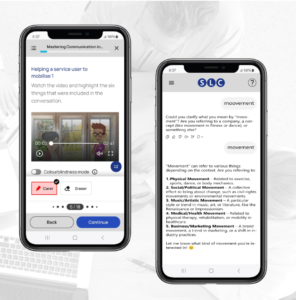
SLC win Ufi grant to develop AI language learning app for social carers
We’re delighted to have won a grant from Ufi VocTech Trust to develop an AI-driven technology solution that provides cheap phone-based language and communication skills

Are you planning to take the OET exam but not sure where to start?
With so much information available online, it can be overwhelming to begin.
In this step-by-step guide, we’ll help you prepare for the exam, learn about the different skills and strategies needed to pass, and share some useful resources that can help you get ready for the big day.
Before you book your OET test, you need to prepare thoroughly.
This involves understanding the format of the exam, practicing your skills and strategies, and improving your language proficiency.
There are two key aspects of OET preparation: knowing the test and improving your English.
You’ll need to work on areas such as grammar, vocabulary, and patient-friendly language to describe medical conditions.
Skimming and scanning skills for reading are also crucial.
Take a look at this short video where OET Jo explains how to prepare for the OET test.
To begin your preparation, start by checking out the OET website.
There you’ll find plenty of resources to help you, including master classes, sample papers, and a preparation portal with links to additional resources.
You can also access free live lessons on the OET Facebook page and watch YouTube videos on OET content, but make sure you stick to official OET and endorsed providers.
When choosing study materials, use OET official materials for practice tests or materials from endorsed providers like SLC.
You can also use websites containing healthcare articles to improve your skills and language.
However, don’t neglect your general English, and be sure to work on improving your grammar and vocabulary.
Plan your study time carefully and use it effectively.
Create a study plan or schedule, work on your skills, and find a study buddy to keep you motivated.
If you need help to reach a Grade B in the OET, then we’re the experts to take you there.
First and foremost, planning and organising your time is crucial.
Create a study schedule or plan to ensure that you’re using your time most effectively.
Remember that a study session doesn’t have to be two hours of studying grammar or doing practice papers. Even a 10–15-minute session can be beneficial if you use that time effectively.
When it comes to studying, here are some do’s and don’ts.
Don’t try to do everything at the same time. Instead, do focus on organizing and planning your time.
Create a study plan or schedule so you know what you’re going to do and what resources you’re going to use.
Don’t only focus on practice papers, but also work on improving your skills and general English.
Do focus on improving your grammar and vocabulary, make notes, and review regularly.
And don’t study alone – find a study buddy or an online study group.
To help you make the most of your study time, here are some 10 to 15-minute study activities that you can try:
Finally, here are some useful websites to help you improve your skills:
In summary, preparing for the OET exam requires a step-by-step approach, with a focus on understanding the format of the exam, improving your skills and language proficiency, and using reliable study materials.
With the right preparation, you’ll be confident and ready to pass the OET exam.
Also, you can hear fantastic advice from OET Jo in our OET SLC Youtube Channel and don’t forget to subscribe for FREE OET tips and strategies materials!

We’re delighted to have won a grant from Ufi VocTech Trust to develop an AI-driven technology solution that provides cheap phone-based language and communication skills

We’re delighted to announce a partnership with leading Medical English app, Doxa.

Back to Menu ↩ What is the UK Foundation Programme? The UK Foundation Programme is a two-year, structured, work-based training programme which is designed to
Get updates and get the latest materials on Medical English, OET and IELTS
